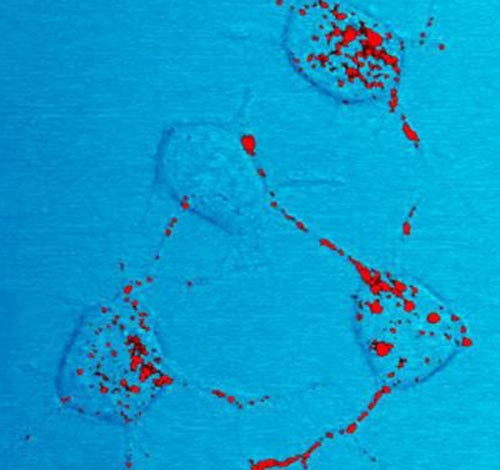Prion diseases: new clues in the structure of prion proteins

Photomicrograph of a neural tissue specimen, harvested from a scrapie affected mouse, revealing the presence of prion protein stained in red.
Credit: National Institute of Allergy and Infectious Diseases (NIAID)
Carbohydrates of the prion glycoproteins responsible for a group of neurodegenerative diseases were sequenced for the first time thanks to a highly sensitive technique.
Prion diseases are a group of rapidly progressive, fatal and infectious neurodegenerative disorders affecting both humans and animals: Bovine Spongiform Encephalopathy (BSE) or ‘mad cow’ disease is one of the most famous since in 1996 scientists found that the agent responsible for the disease in cows, is the same agent responsible for the so-called variant Creutzfeldt-Jakob Disease (vCJD), a disease affecting humans.
A new study carried out by SISSA – Scuola Internazionale Superiore di Studi Avanzati in collaboration with other institutions including Genos Glycoscience Research Laboratory from Zagreb, Croatia and Elettra Sincrotrone Trieste, provides important information on the differences in structures of the prions, proteins responsible for diseases that at the state of the art are incurable.
One of the main unanswered problems revolving around prion diseases is the existence of strains, leading to a wide range of disorders with different symptoms, incubation time, histopathology, etc. “For a better understanding of the mechanism of the diseases and the existence of strains, resolving the structure of the prion protein is necessary” neuroscientist Natali Naki?, first author of the paper “Site-specific analysis of N-glycans from different sheep prion strains”, just published in PLOS Pathogens, says. The prion protein is a glycoprotein, meaning polysaccharides called glycans encompass a large part of the protein structure. The new study is the first one of its kind as it focuses on comparing glycan structures from different strains.
Professor Giuseppe Legname, co-author of the paper, is the Director of SISSA Prion Biology Laboratory and has been collaborating with Elettra Sincrotrone Trieste since 2006: “Carbohydrate of the glycoproteins were sequenced for the first time thanks to the collaboration with Genos Glycoscience Research Laboratory, using a highly sensitive technique called Liquid
Chromatography/Mass Spectrometry” he says. “It has long been questioned whether the diversity in prion strains may depend on the glycans that compose them as well as on protein folding. Our results led us to an answer for the first time”.
“In this study, glycans from two different sheep prion strains were compared”
Natali Naki adds. “After an extensive analysis, no major differences in glycan structures were found between the two strains, suggesting that glycans may not be responsible for the biochemical and neuropathological differences”. A remarkable goal as it represents another step toward the fully understanding of prion glycoproteins and the cellular mechanism of prion diseases.
All latest news from the category: Health and Medicine
This subject area encompasses research and studies in the field of human medicine.
Among the wide-ranging list of topics covered here are anesthesiology, anatomy, surgery, human genetics, hygiene and environmental medicine, internal medicine, neurology, pharmacology, physiology, urology and dental medicine.
Newest articles

Recovering phosphorus from sewage sludge ash
Chemical and heat treatment of sewage sludge can recover phosphorus in a process that could help address the problem of diminishing supplies of phosphorus ores. Valuable supplies of phosphorus could…

Efficient, sustainable and cost-effective hybrid energy storage system for modern power grids
EU project HyFlow: Over three years of research, the consortium of the EU project HyFlow has successfully developed a highly efficient, sustainable, and cost-effective hybrid energy storage system (HESS) that…

After 25 years, researchers uncover genetic cause of rare neurological disease
Some families call it a trial of faith. Others just call it a curse. The progressive neurological disease known as spinocerebellar ataxia 4 (SCA4) is a rare condition, but its…





















